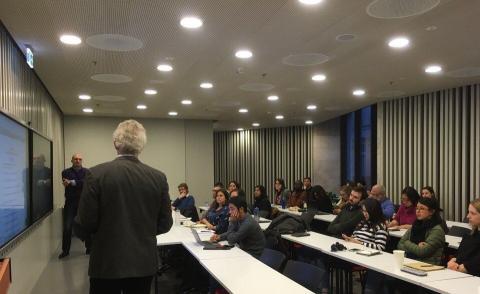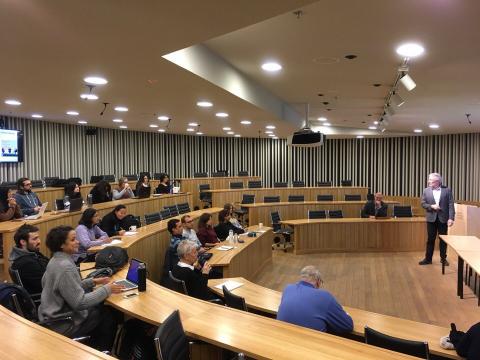Open Lectures by Group on Earth Observations at CEU

In the beginning of February Dr. Douglas Cripe, the Work Programme Coordinator from the Group on Earth Observations (GEO) Secretariat, visited CEU to give two lectures on the application of Earth Observations in support of SDGs and Disaster Resilience. The talks organized by Department of Environmental Sciences and Policy and Systems Laboratory took place on February 6 and 7 and were focused on Earth Observations in service of the 2030 Agenda for Sustainable Development and their role in Disaster Risk Reduction (DRR), correspondingly.
GEO works to connect the demand for timely and accurate environmental information with the data and information collected through observing systems, and made available by the GEO community. In his first lecture, Dr. Cripe talked about the Earth Observations for SDGs Initiative, the primary purpose of which is to organize and realize the potential of Earth Observations and geospatial information to advance the 2030 Agenda and enable societal benefits through achievement of the SDGs.
The second talk was focusing on how GEO supports disaster resilience by increasing coordination of Earth Observations to forecast and prepare for disasters, to mitigate damage and to better manage and recover from disasters. The Sendai Framework for Disaster Risk Reduction 2015-2030 includes two articles with explicit references to satellite Earth Observation and several articles that refer to topics for which satellite observations are needed. GEO aims at improving disaster risk management and reduction by providing timely risk information relevant to the full cycle of disaster management (mitigation, preparedness, warning, response, and recovery) and will be used directly by the end user community including the decision makers that have to take appropriate resilience and DRR measures. The recording of this talk can be found here.

A central part of GEO’s mission is to build the Global Earth Observation System of Systems (GEOSS). GEOSS is a set of coordinated independent earth observations and processing systems that interact and provide access to diverse information for a broad range of users in both public and private sectors.
Find out more about the CEU Open Lecture Series on Disaster Management and register to show your interest in attending any of the upcoming talks and receiving updates on future events.





